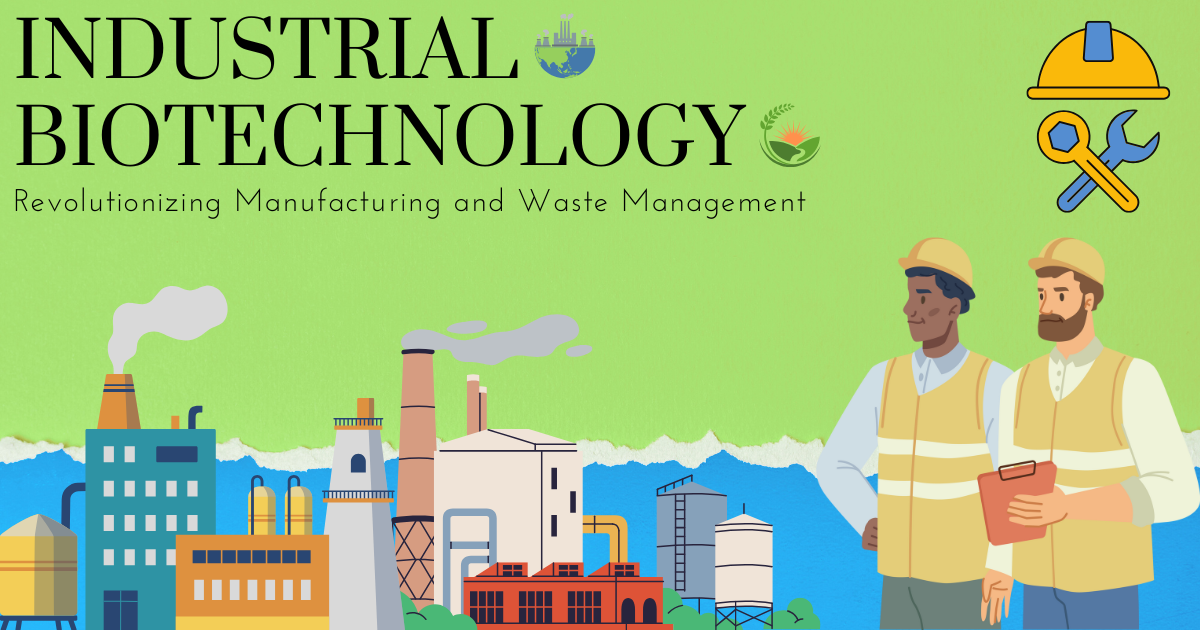Industrial Biotechnology: Revolutionizing Manufacturing and Waste Management. With the help of industrial biotechnology, a huge variety of products can be manufactured from bio-based raw materials. It has many advantages, and the major one is that it will decrease the environmental impact. It is a field at the crossroads of biology and engineering that has emerged as a transformative force in modern manufacturing. To know more about the topic “Industrial Biotechnology: Revolutionizing Manufacturing and Waste Management,” read the complete article.
Industrial Biotechnology
Industrial biotechnology can produce a wide range of products (chemicals, materials, food and beverages, biofuels, and biodrugs) from bio-based raw materials. It can reduce environmental impact by using biomass as an alternative to fossil resources for manufacturing bioproducts, biofuels, and biopolymers. Biotechnical processing uses enzymes and microorganisms to produce products that are useful to a broad range of industrial sectors, including chemical and pharmaceutical, human and animal nutrition, pulp and paper, textiles, energy, materials and polymers, and renewable raw materials.

By developing fermentation techniques and using and designing new bioreactors, as well as genetic engineering techniques, products having a huge economic impact on the industry have been obtained, as they are less expensive and more environmentally friendly than their counterparts made with chemical synthesis. Industrial biotechnology boosts productivity while using fewer resources (water and traditional chemical products) and less power. It cuts emissions (including greenhouse gases) and reduces the use of fossil fuels. It also generates less waste and is an essential tool for treating and reusing waste.
Revolutionizing Manufacturing and Waste Management
Industrial biotechnology, often called white biotechnology, is indeed revolutionizing manufacturing and waste management by using living organisms and their enzymes to create industrial products and processes that are more sustainable and efficient. Let’s discuss them briefly:
Revolutionizing Manufacturing
- Biotechnology has improved the production of paper, textiles, plastics, chemicals, fuels, and pharmaceuticals, speeding the production process and reducing water, energy, and raw material inputs as well as pollution.
- Industrial biotech researchers examine bacteria, microbes, and other natural material with DNA probes to identify enzymes with certain capabilities, such as the ability to bleach paper or break down plant matter, which can thereby enable or speed industrially useful biochemical reactions.
- Biotechnology has replaced materials and chemical processes that are harmful to the environment with more environmentally friendly and sustainable biological alternatives.
- By introducing particular genes into these microorganisms, researchers can steer their metabolic pathways towards desired products, making the production process more efficient and environmentally friendly.
Revolutionizing Waste Management
- A significant advantage of industrial biotechnology is its capacity to transform waste into valuable products. Waste is typically seen as a burden on the environment but is transformed into a resource through processes like fermentation, anaerobic digestion, and enzymatic hydrolysis.
- Advanced biotechnological processes, such as anaerobic digestion, convert organic waste into biogas, a renewable energy source, while simultaneously reducing the volume of waste.
- The use of microbial fuel cells, which generate electricity from wastewater, is an emerging technology with the potential to revolutionize waste treatment and energy production.
- Microorganisms can be engineered to degrade pollutants and toxins present in soil and water. This approach, known as bioremediation, offers a sustainable solution to cleaning up contaminated sites.
- Microbes can be employed to produce valuable chemicals bioplastics, and other bio-based materials from waste streams, adding economic value to waste management.
Challenges in Industrial Biotechnology
Technical Challenge: One of the significant technical challenges in bioprocessing is the usage of microbial isolates and cell lines. Obtaining high yields and productivities often needs extensive genetic engineering and metabolic pathway optimization, which can be complicated and time-consuming.
Economic Challenges: The elevated costs regarding bioreactor systems, raw materials, and process development pose major economic challenges. Bioreactors and other machinery for biomanufacturing are often expensive, requiring substantial capital investment. Additionally, the cost of raw materials, such as feedstocks and growth media, can greatly impact the overall economics of bioprocessing.
Environmental Challenges: While industrial biotechnology provides more sustainable options to traditional chemical processes, it is not without environmental challenges. The elimination of biowaste, including spent microbial cultures and fermentation residues, must be handled to reduce environmental impact. Biowaste can contain high levels of organic matter and nutrients, which, if not properly treated, can lead to pollution and saturation of water bodies.
